|
RUGER
BEARCAT
1958
to 1970
The Ruger “Bearcat” .22 single action
revolver was first announced in the August 1958 issue of the National
Rifle Association’s American Rifleman
magazine. Sturm,
Ruger & Co. began shipping these fine little guns the
same month.
The original Bearcat had a one-piece
cylinder/grip frame made of an aluminum alloy that was blue
anodized, a 4” steel barrel, six shot non-fluted steel
cylinder that was roll marked with a “Bear and a Cougar”
scene and with the words “Ruger” and “Bearcat”.
The gun had a Colt style fixed grooved rear sight
and a ¼ inch tall fixed front sight with no base.
It also had a steel ejector rod housing, a concave faced
ejector rod button, and a gold/brass colored anodized trigger
guard. The grip
panels were rosin impregnated rosewood without a medallion.
The gun’s overall length was only 8-3/4 inches and it
weighed in at a scant 17 ounces.
The suggested retail price was $49.50.
One of Bill Ruger's favorite automobiles was the
Stutz Bearcat and it is said that he named this revolver
after that automobile. It
is also believed that the 1858 Remington New Police
percussion revolver inspired many of the styling characteristics
that can be seen in the little Bearcat.
As you can see from pictures in this article, these two
revolvers demonstrate an amazing similarity.
Gun enthusiasts and outdoorsmen quickly took a
liking to this light, compact, quality made, dependable revolver
and its introduction was a great success. It quickly became a favorite sought after trail gun or
backpack “kit” gun.
The Bearcat was so popular in fact, that due to
favorable sales volumes, the August 1958 introductory price of
$49.50 was reduced to $39.50 in March 1961.
It was not increased again until 1969 when the suggested
retail price went to $44.00
During its production the gun had several
variations, but its original design remained virtually unchanged
during its 12 year production period.
Some of the most notable changes were the use of a
shorter front sight (reducing the height from ¼ inch to 3/16
inch), changing the ejector rod housing from steel to anodized
aluminum, replacing
the concave/dimpled ejector rod button with a flat faced button,
and the use of oil filled grip panels with the trademark Ruger
Eagle logo stamped into
an aluminum medallion.
The Bearcat’s serial numbering is also a very
interesting subject and has created much discussion over the
years by collectors. Varying
opinions still exist today.
The Bearcat’s serial numbering began with
number 1 and continued through 999.
These guns were first shipped beginning August 1958 and
some in early 1959.
Then the so-called “Alphabet” Bearcat series was
introduced. The
“Alphabets” had a 3-digit number preceded by a letter of the
alphabet (i.e., A001, B458, C937…..Z999).
All of the letters of the alphabet were used in this
numbering scheme except the letter “O”.
The first “Alphabets” were shipped in October 1958,
during the same time that the first 999 guns were still being
shipped, and continued until early 1960.
It is not known by this author exactly why the
“Alphabet” numbering system was put into production.
Some believe that due to intense competition in the gun
industry, Bill Ruger changed the numbering system to confuse the
competition and conceal the actual number of Bearcats being
made. Maybe someday
we will find out the real answer, but it sure makes for an
interesting group of highly collectible and desirable Bearcats.
Discussions often center around just how many of
the Alphabet guns were made by this relative small upstart of a
company. If 999 of
each alphabet letter were produced this would be about 25,000
Bearcats produced in about 18 months.
One must remember that the company was also making the Standard
Auto and Target model pistols, the Single-Six
.22 revolver, the .357
Magnum Blackhawks, the .44
Magnum Blackhawks, and had just started production of
the Super Blackhawk
during this period. Many
collectors do not believe it would be possible to produce that
many Bearcats in that short of a time and think that many blocks
of numbers within the letters were skipped making it far less
“Alphabets” made than one might think.
These “Alphabets” certainly make a very interesting
and desirable variation of the “Cat” for the collector to
peruse and obtain. They
will bring a premium when found in excellent condition.
In March 1960 a few special production guns were
made in the serial number range 1000 to 1999.
Only a few are known to exist and are extremely rare.
Serial numbers from 2000 to 114730 were made March 1960
to December 1968. The height of the serial number itself was changed at about
serial number 35,000 from 1/16 on an inch to 1/8 inch. Then due
to the “Gun Control Act of 1968”, all firearms manufactured
had to have its own unique serial number…no two guns could be
numbered the same number. Thus
Ruger introduced its “prefix” numbering system in January
1969. The Ruger
Bearcat had the prefix of “90” added to its serial numbers.
Known are serial numbers 90-00022 to 90-25622.
There are several very interesting and
scarce/rare/very rare standard and non-standard variations of
the Bearcat. A
collector can put together a fine and interesting collection if
they can obtain many of these different standard and
non-standard variations.
Estimates
range from around 140,000 to 160,000 of these fine little
revolvers being made in its 12 year lifetime from August 1958
through June 1970, when Bearcat production ceased. They are great guns to collect and a handy “kit” gun to
own and shoot.
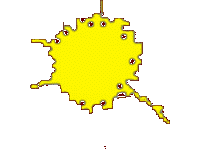  
SOME
OF THE MAJOR
STANDARD VARIATIONS
S/N 1 - 999
All standard features of the first guns.
Also may have fluted or
non-fluted staked front sight or a capped or drilled
through base pin
latch nut.
“Alphabets” S/N A001 – approx. M500
All standard features of the first 999 guns.
I believe these all have fluted staked front sights.
“Alphabets” S/N approx. M500 – X165
The
concave/dimpled ejector rod button was changed to a flat faced
button.
“Alphabets” S/N approx X165 –Z999
The front
sight blade was shortened from ¼ inch to 3/16 inches to lower
and improve the point of aim.
S/N 2000 - 35000
Flat faced ejector rod button, shortened (3/16")
front sight blade. Steel
ejector rod housings (ERH) were used on most of these 1/16"
serial numbered guns. A
few blue anodized aluminum housing can be found on some Bearcats
beginning in the 33000 serial number range.
S/N 35000 – 114000
The grips were changed to oiled walnut with a
light stamped Ruger Eagle trademark logo medallion and the
larger 1/8 of an inch serial numbers were put into use.
A mixture of steel and
blue anodized aluminum ejector rod housings were used on the
guns at the beginning of this serial number range.
At about 50000 the aluminum housings took over almost
totally. It is
estimated that about 15,000 or so of this variation had the
steel housings. Most
of these guns had a “SR” intertwined inside of the Ruger
eagle logo in the barrel address with about 5000 of the guns
toward the end of the range not having it.
S/N 107000 – 114000
The medallion in the grip panel was changed to
a heavy stamped trademark Ruger Eagle logo at the end of
1968/beginning of 1969.
S/N 90-00001 – 90-25622
In 1969 the serial number had a “prefix”
of “90” added
due to the “Gun Control Act Of 1968” that required every gun
manufactured to have a unique stand alone serial number.
SOME
OF THE
MAJOR NON-STANDARD
VARIATIONS
Duplicate serial numbered guns
These guns erroneously had serial numbers the
same as other Bearcats. When
discovered they were stamped with a “D” prefix or suffix to
the serial number. Very
few known.
Trade show samples and seconds
These guns were sold, probably at a discount
to distributors and were stamped with a “S” on the bottom of
the cylinder/grip frame or suffix to the serial number. Very few known.
999XXX serial numbers
Out of sequence six digit serial numbers used
in 1968. May have
been some type of duplicate numbering scheme?
Very scarce with only about 1200 believed made.
“Blackguard” Bearcat
Black anodized or “japanned” finished
trigger guards, 109 believed made.
Highly sought after by collectors.
Trademark Application Guns
Two or three Bearcats were roll marked
“Service-Six", "Speed-Six", and perhaps one
"Security-Six”. Used
by Ruger to apply for trademark when beginning the double action
“Six” Series of revolvers.
One of a kind
guns.
Special Order “Gun Writer” gun
S/n 1000, a special order by Bill Ruger for
writer Bob Wallack.
It has a tall front sight and a flat faced ejector rod
button like the “L” to “X” series Alphabet Cats.
One of a kind gun.
Inscribed Bearcat
Inscribed on the grip frame backstrap, “To
Herb Glass from Bill Ruger”.
This gun has two one of a kind features, a 3/16 inch
brass front sight and a milled notch in the left side of the
receiver so you could view a loaded cartridge case rim.
Only one made, s/n 16.
Engraved Bearcat
In the factory collection.
Engraved by John Warren on special order from Bill
Ruger. S/n 43813,
the only Bearcat engraved by factory.
  
If
anyone has any additional information on these little guns it
would be most appreciated.
As you can see, the Bearcat has many interesting standard
and non-standard variations that can keep a collector real busy
for quite some time attempting to obtain good specimens.
These are great little guns….I suggest that you all get
you a few!!
Bill Hamm
Read more about Bill on the
"About Us" page.
  
Got something to say about this article? Want to agree (or
disagree) with it? Click the following link to go to the GUNBlast Feedback Page.
The Ruger Owners & Collectors
Society is an active organization for all Ruger Owners, Shooters and
Collectors. Annual Membership includes a ROCS Logo
Brassard, the latest Digest Magazine and an invitation to
ROCS events. There will be two Digest magazines published
every year. For more information and to apply for annual
membership please visit www.Rugersociety.com on
the web or write to ROCS, P. O. Box 1026, Killen, AL
35645-1026. We welcome you!!
|
|
Click pictures for a larger version.

This is Ruger Bearcat
#375 along with a 1858 Remington New Police.
I believe that Bill Ruger patterned the Bearcat after
this percussion revolver, as you can see, they have a lot of
similarities.
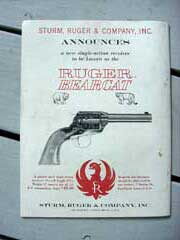
Advertisement for the
new Ruger Bearcat from the back cover of the October 1958
issue of GUNS Magazine.
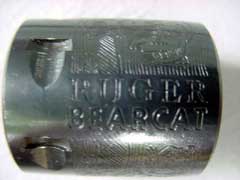
Close-up view of a
Bearcat cylinder’s words “RUGER BEARCAT”.
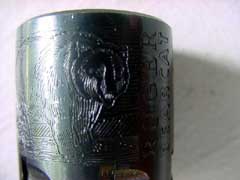
Close-up view of the
“Bear” on a Bearcat cylinder.
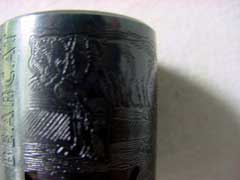
Close-up view of the
“Cougar” or “Cat” on a Bearcat cylinder.
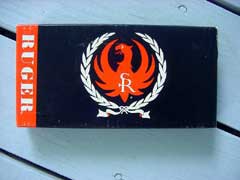
Top view of a Bearcat
box top.
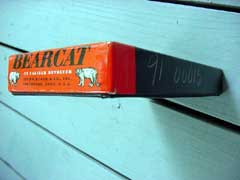
End and right side view
of a Bearcat box top.
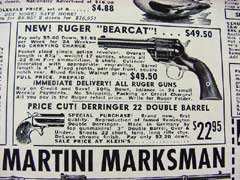
This advertisement from
Klein’s of Chicago, IL would allow you to buy a Bearcat on a
“Lay-away” plan…and they would mail it directly to you.
Ah, the good old days!!
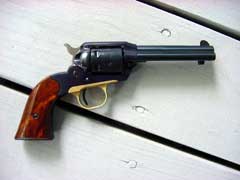
This is Bearcat #19. It is new in its original box and shipping carton.
It was originally shipped to Pete Kuhlhoff, Argosy
Gun Writer. Extremely
rare Cat!!
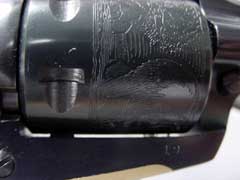
Close-up view of
#19’s serial number.
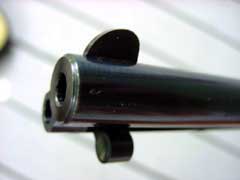
This is #19’s ¼”
tall front sight and concave/”dimpled” ejector rod button
found on the first early production guns.
This gun has a “non-fluted” staked front sight
blade. The blades
could be fluted or non-fluted on the early one, two, and three
digit guns.
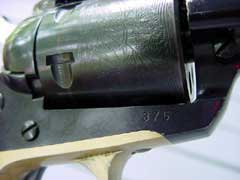
Close-up view of a rare
three digit Bearcat’s serial number, #375.
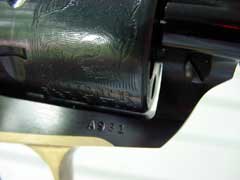
Close-up view of the
first “Alphabet” series #A931.
The “Alphabets” all had a letter of the alphabet as
a prefix to their 3-digit numeric serial number.
All letters of the alphabet were used except the letter
”O”.
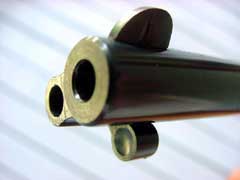
View of Alphabet
#A931’s tall ¼” “fluted” staked front sight and
concave ejector
rod button. These
were found on the first variation of the Alphabet guns serial
numbers A001 through approx. M500.

Close-up of Alphabet
#L922’s serial number.
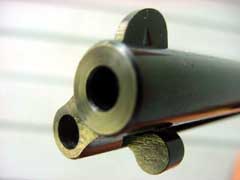
View of Alphabet
#L922’s fluted tall ¼” front sight and the new “flat”
faced ejector rod button.
The button change created the second variation of the
Alphabet series. Approx.
M500 through X165.
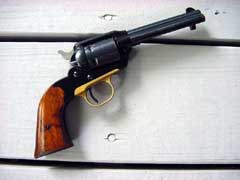
This is Alphabet #Z448,
one of the very scarce 3rd variation of the
Alphabet series with it’s shorter factory 3/16” fluted
staked front sight.
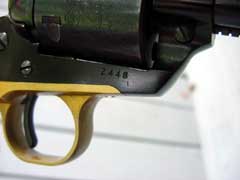
Close-up of Alphabet
#Z448’s serial number.
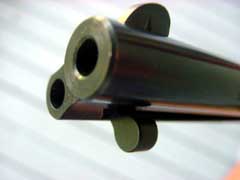
View of #Z448’s
shorter 3/16” fluted staked front sight and flat faced
ejector rod button.
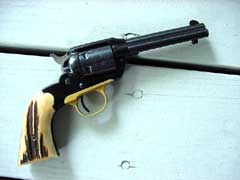
Serial number 5085, one
of the early Bearcats after the Alphabet series.
They had the same characteristics of the last
Alphabets…3/16” fluted front sights and large flat ejector
button. This
Kitty sports a nice old set of pretty stag grip panels.
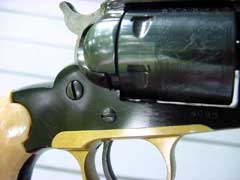
Close-up view of
#5085’s serial number.
The small 1/16” height numbers were used on the
Bearcats up through approximately 35000.
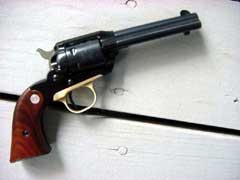
This is Bearcat #53702,
toward the end of a variation that has the larger 1/8”
serial number and oiled grip panels with the light stamped
medallion but still retains a steel ejector rod housing.
Almost all Bearcats had aluminum ERHs after serial
number 50000.
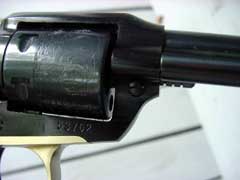
Close-up view of
#53702’s serial number and a portion of the steel ejector
rod housing.
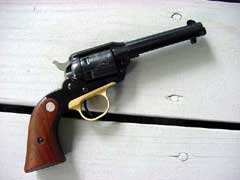
Serial number 68112,
larger 1/8” height s/ns, aluminum ejector rod housing, oiled
walnut grip panels with “light” stamped aluminum
medallions.
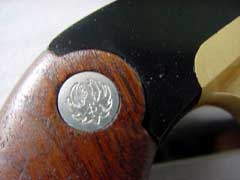
Close-up view of a
“light” stamped medallion with the trademark Ruger Eagle.
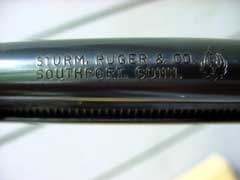
Close-up of a
Bearcat’s barrel address.
This address has the intertwined “SR” in the
trademark Ruger Eagle logo.
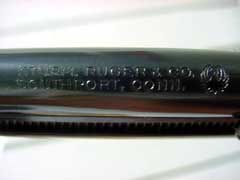
Close-up view of a
Bearcat’s barrel address that no intertwined “SR” in the
trademark Ruger Eagle Logo.
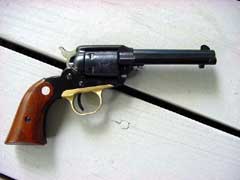
This is a “prefix”
serial number #90-17616.
The prefix was added in 1969 to individualize each
gun’s serial number after the “Gun Control Act Of 1968”
was passed with this requirement.
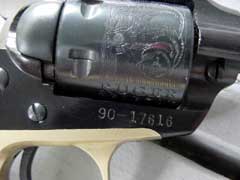
Close-up view of
#90-17616 “prefix” serial number.
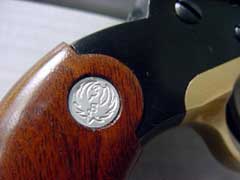
Close-up view of the
“heavy” stamped grip medallion on #90-17616.
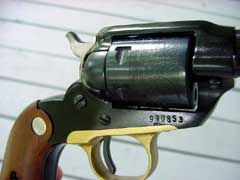
Close-up view of one
of the rare “six-digit” Bearcat's serial number.
This one is #990853.
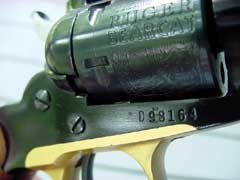
Close-up view of one of
the rare duplicate serial numbered Bearcats.
This is a ”D” prefix stamped Bearcat, s/n D98164.
There is a Bearcat out there somewhere numbered 98164
that needs to be paired up with this little bugger!
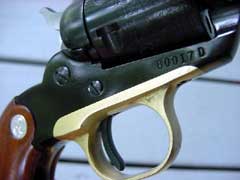
Close-up view of one of
the rare duplicate serial numbered Bearcats with a suffix “
D” stamp. S/n 80017D. Anyone
owning #80017 sure has a buyer if they want to sell it!!
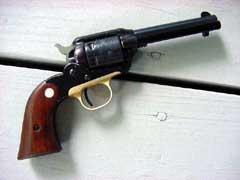
This is a very rare
“second or used” Bearcat.
S/n 61686, few made.
It has a small “s” stamped under the cylinder/grip
frame ahead of the trigger guard.
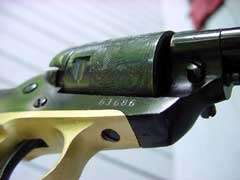
Close-up view of
#61686’s serial number and the small “s” stamped on the
bottom of the cylinder/grip frame in front of the trigger
guard. Very rare
gun.
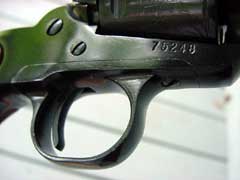
One of the highly
sought after “Blackguard” Bearcats with the blue/black
anodized or “japanned” trigger guards.
Very rare.
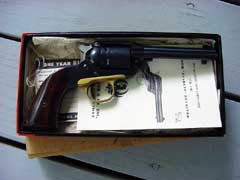
View of the one of a
kind “Inscribed” Bearcat #16 laying in its box on top of
its cardboard shipping carton.
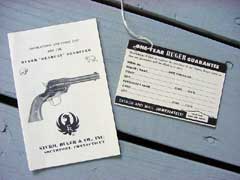
#16’s original
instructions and warranty card.
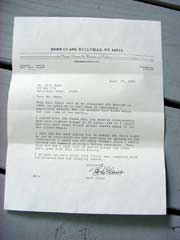
Original letter from
Mr. Herb Glass telling about his testing of #16 for Bill
Ruger. He
explains his requested modifications to the little gun when he
returned it to Bill Ruger.

View of the inscription
on the back strap of #16, “To Herb Glass from Bill Ruger”.
The box and shipper can be seen in the background.
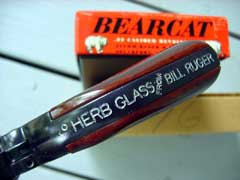
Another view of #16’s
inscription.
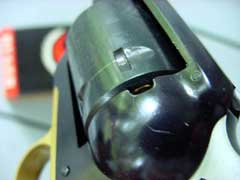
View of the one of a
kind factory “milled notch” of the left side of the
receiver of Bearcat #16.
This was done so you can see the cartridge rim of the
case in the loaded chamber.
Bill Ruger performed this alteration at the request of
Herb Glass after he had tested and returned the gun.
Bill also had the Bearcat
inscribed on its grip frame backstrap and later sent it
back to Herb as a gift.
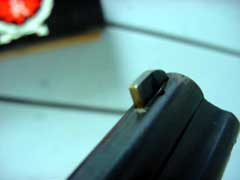
View of the other
alteration requested by Herb Glass after testing #16.
A shorter 3/16” fluted staked “brass” front sight
blade was installed. This
is the only Bearcat with these factory alterations.
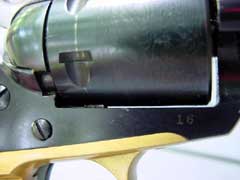
Close-up view of
#16’s serial number.
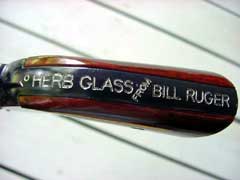
Another close-up view
of the back strap inscription on Herb Glass’ #16 Cat.
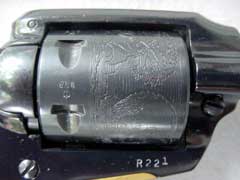
View of a rare British
Proof marked Alphabet Bearcat that made it back to the States.
This one is R221 and you can see the small British
Crown Proof mark on the cylinder.
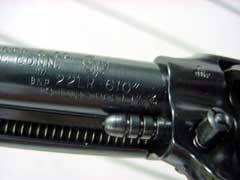
This is a view of the
Proof marking on the barrel and left side of the cylinder
frame of Alphabet R221.
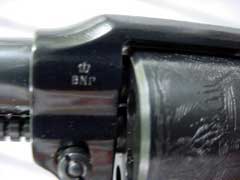
Close-up view of the
small proof mark on Alphabet R221’s cylinder frame.
|
![]()